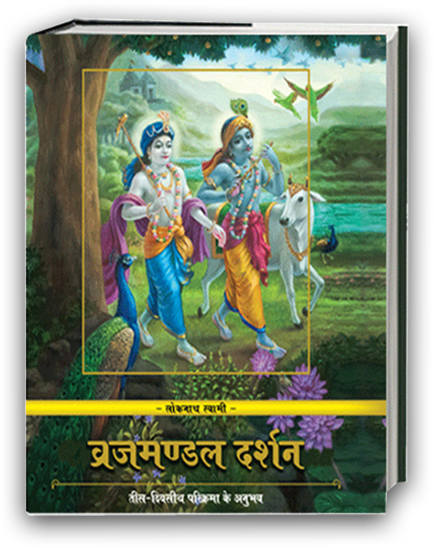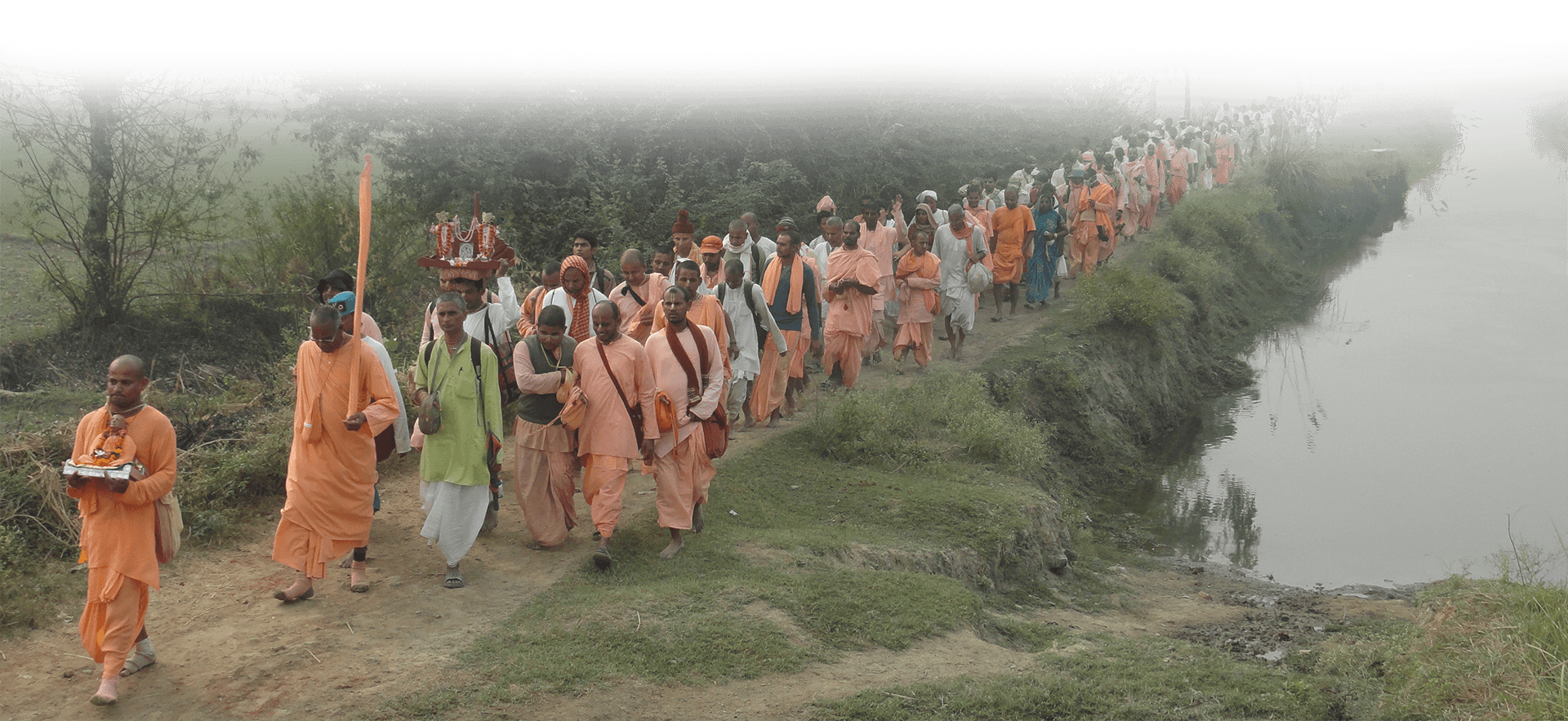“Let me glorify Vrajabhūmi, the place where Śrī Kṛṣṇa enjoys transcendental pastimes. Simply by drinking with their ears the nectarean description of Vrajabhūmi, the liberated souls abandon the bliss of impersonal Brahman and yearn to attain the land of Vraja.” (Śrī Vraja-rīti-cintāmaṇi, text 1)
“When Kṛṣṇa descends to the material world, this same Vṛndāvana descends with Him, just as an entourage accompanies an important personage. Because when Kṛṣṇa comes His land also comes, Vṛndāvana is considered to exist beyond the material world. Therefore devotees take shelter of the Vṛndāvana in India, for it is considered to be a replica of the original Vṛndāvana.” (Caitanya-caritāmṛta, introduction)
“[Śrīla Prabhupāda]: … If we live in Vrindaban, we are living with Kṛṣṇa, because Vrindaban is nondifferent from Kṛṣṇa. There’s no difference between the original Vrindaban and this Vrindaban. Vrindaban is so powerful. “… This Vrindaban is Krishna’s house. Therefore it’s as good as Goloka Vrindaban.” (Vrindaban Days, pp. 32–33)
“Śāṇḍilya Ṛṣi said: Dear Parīkṣit and Vajranābha! I will tell you the secret of Vrajabhūmi. Listen carefully. The meaning of the word vraja is “all-pervasive.” According to ancient opinions, this land is named Vraja because it is all-pervasive. This land is an all-pervasive spiritual manifestation, situated beyond the three modes of material nature. Therefore this is called Vraja. This land is ever blissful, effulgent, indestructible, and the abode of liberated souls. Dear kings, in this land of Vraja the self-realized souls and devotees who relish love of God constantly experience Kṛṣṇa, whose form is sac-cid-ānanda. Śrīmatī Rādhikā, the daughter of Mahārāja Vṛṣabhānu, is like the ātmā of Lord Śrī Kṛṣṇa, the son of Nanda Mahārāja.” (Śrīmad-Bhāgavatam-māhātmya, Skanda
Purāṇa, chapter 1)
“Places of pilgrimage yield a special advantage for a devotee in quickly advancing his spiritual life. Lord Kṛṣṇa lives everywhere, but still it is very easy to approach Him in holy places of pilgrimage because these places are inhabited by great sages. Lord Śrī Kṛṣṇa says that He lives wherever His devotees are chanting the glories of His transcendental activities. ... Dhāma refers to a place where one can immediately contact the Supreme Lord. ... Similarly, there are other holy places of pilgrimage, such as Prayāga (Allahabad) and Mathurā, and the topmost of them all is Vṛndāvana. ... There are twelve forests in the area of Vṛndāvana, and Madhuvana is one of them. Pilgrims from all parts of India assemble together and visit all twelve of these forests. There are five forests on the eastern bank of the Yamunā: Bhadravana, Bilvavana, Lauhavana, Bhāṇḍīravana, and Mahāvana. On the western side of the bank there are seven: Madhuvana, Tālavana, Kumudavana, Bahulāvana, Kāmyavana, Khadiravana, and Vṛndāvana.” (Śrīmad-Bhāgavatam 4.8.42, purport)
“The Viṣṇu-rahasya states that Vraja-maṇḍala, being nondifferent from the Lord, has a form, and that fifty-five different parts of that form are represented by fifty-five forests of Vraja. Some of these forests are principal and others are secondary. Mathurā is the heart, Madhuvana is the navel, Kumudavana and Tālavana are the two parts of the chest, Vṛndāvana and Mayūrvana are the forehead, Bahulāvana and Mahāvana are the biceps, Bhāṇḍīravana and Kokilavana are the hands, Khadiravana and Bhadrakavana are the shoulders, Chattravana and Lohajaṅghavana are the lotus eyes, Bilvavana and Bhadravana are the ears, Kāmyavana is the chin, Triveṇī and Sakhī-kūpa are the lips, Vihvala and others are the teeth, Surabhivana is the tongue, Mānengītāvana is the nose, Śeṣaśāyī and Paramānandavana are the nostrils, Karela and Kāmāi are the hips, Karṇavana is the genitals, Kṛṣṇakṣipanak is the rectum, Nandanavana is the head, and Indravana is the back. The five fingers of the right hand are Śikṣāvana, Candrāvana, Lohavana, Nandagrāma, and Śrī-kuṇḍa. The five fingers of the left hand are Garhasthāna, Lalitā-grāma, Varṣāṇā, Gokula, and Baladeva. The five toes of the left foot are Govardhana, Jāvaṭa, Saṅketavana, Nāradavana, and Madhuvana. The five toes of the right foot are Mṛdvana, Jahnuvana, Menakāvana, Kājalivana, and Nandakūpavana.” (Vraja-bhakti-vilāsa, chapter 1)
“In Vṛndāvana the trees and vines filled with multitudes of wonderful, transcendental, splendid flowers and fruits, the blissful excited cooing of the multitudes of splendid transcendental peacocks, cuckoos, parrots, and other birds, the many multitudes of splendid transcendental lakes, streams, hills, and newly blossoming forest groves, as well as the golden ground studded with jewels, have all enchanted me.” (Śrī Vṛndāvana-mahimāmṛta, śataka 2, text 2)
“Even today affectionate Lord Kṛṣṇa enjoys the very sweet nectar of transcendental pastimes there, herding the cows with His brother and His many dear friends. A wonderful sweetness becomes manifest in the heart of they who understand the nectar of this place. Of Vraja, which is more dear even than the city of Mathurā, I take shelter.” (Śrī Vraja-vilāsa-stava, text 6)
“With Their soft, flower-petal hands Śrī Rādhā-Kṛṣṇa carefully watered the trees and vines from the time of their first sprouting. They nourished them and made them grow and, at the proper time, married each vine to an appropriate tree. When They saw new flowers beginning to blossom, They became delighted and spoke many playful joking words. Let us bow down and offer our respectful obeisances to these trees and vines of Vṛndāvana forest.” (Śrī Vṛndāvana-mahimāmṛta, śataka 2, text 11)
“Śrī Caitanya Mahāprabhu’s mind was absorbed in ecstatic love at Jagannātha Purī, but when He passed along the road on the way to Vṛndāvana, that love increased a hundred times. The Lord’s ecstatic love increased a thousand times when He visited Mathurā, but it increased a hundred thousand times when He wandered in the forests of Vṛndāvana. When Śrī Caitanya Mahāprabhu was elsewhere, the very name of Vṛndāvana was sufficient to increase His ecstatic love. Now, when He was actually traveling in the Vṛndāvana forest, His mind was absorbed in great ecstatic love day and night. He ate and bathed simply out of habit.” (Caitanya-caritāmṛta, Madhya 17.226–29)
“As the darkness is dissipated by the sunshine, as a mountain is broken into pieces by the strike of the thunderbolt, as a snake runs away in fear of Garuḍa, as a cloud is pushed away by the force of the wind, as one's miseries are mitigated by achieving knowledge of the truth, and as other animals run away upon seeing a lion, one's heaps of sinful reactions are destroyed at once simply by seeing the land of Mathurā.” (Mathurā-māhātmya, texts 7–8)
“In the Brahmāṇḍa Purāṇa it is said that all the results of traveling on all the pilgrimages within the three worlds can be achieved simply by touching the holy land of Mathurā.” (The Nectar of Devotion, p. 102)
“O brāhmaṇas, it is extremely rare for persons of this world to observe the Kārtika vow in Mathurā-maṇḍala, for by worshiping Dāmodara in the month of Kārtika in Mathurā the Lord awards the worshiper the liberation of having the same features as the Lord. If one worships Kṛṣṇa elsewhere He awards one material enjoyment and liberation; but He never awards devotional service, which controls even Him. Yet if people go to Mathurā and worship Śrī Dāmodara only once in the month of Kārtika, they immediately obtain that devotional service to Hari.” (Mathurā-māhātmya, texts 175–177)
“Cultivating Kṛṣṇa consciousness in Vṛndāvana is the best means of being liberated from material bondage, for in Vṛndāvana one can automatically meditate upon Kṛṣṇa. Vṛndāvana has many temples, and in one or more of these temples one may see the form of the Supreme Lord as Rādhā-Kṛṣṇa or Kṛṣṇa-Balarāma and meditate upon this form.” (Śrīmad-Bhāgavatam 9.19.19, purport)
“This is especially true in Vṛndāvana; any person may go there, and even if he is sinful he will at once contact an atmosphere of spiritual life and automatically chant the names of Kṛṣṇa and Rādhā. That we have actually seen and experienced.” (Śrīmad-Bhāgavatam 3.20.4, purport)
“The system of circumambulating all these places is still current among devotees of Lord Kṛṣṇa, and those coming to Mathurā and Vṛndāvana always feel transcendental pleasure. Actually, if someone goes to Vṛndāvana, he will immediately feel separation from Kṛṣṇa, who performed such nice activities when He was present there.” (The Nectar of Devotion, p. 139)
“[W]hen will Nityānanda bestow His causeless mercy upon me so that my desire for material enjoyment will become very insignificant? When will that time come? When my mind is completely purified, being freed from material anxieties and desires, then I shall be able to understand Vṛndāvana and the conjugal love of Rādhā and Kṛṣṇa, and then my spiritual life will be successful.” (Lālasā-mayī Prārthanā, texts 2–3)
“The cultivation of Kṛṣṇa consciousness is possible where great devotees live together and constantly engage in hearing and chanting the glories of the Lord. In a holy place like Vṛndāvana, there are many devotees constantly engaged in chanting and hearing the glories of the Lord. If one gets the chance to hear from pure devotees in such a place, allowing the constant flow of the river of nectar to come from the mouths of pure devotees, then the cultivation of Kṛṣṇa consciousness becomes very easy.” (Śrīmad-Bhāgavatam 4.29.39–40, purport)
“May my eyes become overwhelmed with ecstasy by seeing the nectar waves of Vṛndāvana’s beauty! May my intelligence drown in the nectar ocean of Vṛndāvana’s glories! May my body become agitated by the swiftly moving currents of ecstatic bliss and thus roll about on the ground of Vṛndāvana! Falling down like a stick, may I offer my respectful obeisances to all the residents of Vṛndāvana.” (Śrī Vṛndāvana-mahimāmṛta, śataka 1, text 14)
“Don’t, don’t harbour illusions about your body, home and everything else! Know that death will thwart all your plans! O friend, run, run to Śrī Vṛndāvana! Don’t make your heart harder than a thunderbolt.” (Śrī Vṛndāvana-mahimāmṛta, śataka 1, text 70)
“Let hundreds of arrows of harsh words pierce my heart. Let hundreds and hundreds of kicks fall on my head. Let hundreds of days pass where I am unable to get even the smallest meal. Remembering at every moment the fair and dark glories that are my life’s treasure, and whose forms are two oceans of sweet nectar, I shall happily live in Vṛndāvana.” (Śrī Vṛndāvana-mahimāmṛta, śataka 4, text 46)
[Śrīla Prabhupāda]: “[F]rom ’62 to ’65, when I lived here, I would sit in these rooms and chant Hare Krishna and see the samādhis of Jīva and Rūpa Gosvāmīs. Just by thinking of how they wrote I got courage to write. I would type and cook a little. I lived very simply, content to be in Rūpa Gosvāmī’s presence. … Now I have hundreds of temples to go to, but I still like it here best of all.” (Vrindaban Days, p. 30)









